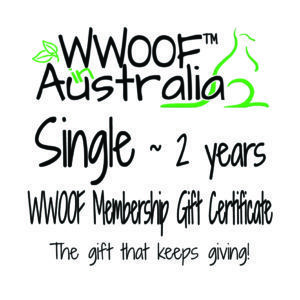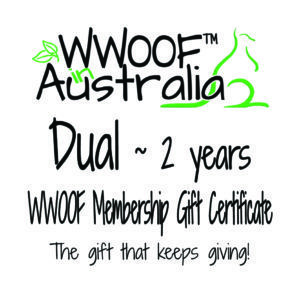WWOOFing with Paulien & Mathijs WWOOFing since since March 2020
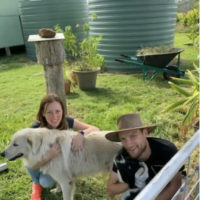
Meet Paulien and Mathijs a Belgian couple travelling Australia. Mathijs is an engineer and an athlete, so training and nutrition is particularly important. Having both grown up in families that had gardens and chickens they too have the same mindset.
Paulien is a (pastry) chef who loves cooking with fresh picked vegetables and fruits, so when they started looking for travelling options, they felt WWOOFing around Australia would be the perfect fit.
We had a window of opportunity to catch up with them and ask a few questions and here is what they had to say.
Why did you choose Australia?
We arrived on the 7th of March, just on time before the borders closed! I always wanted to come to Australia for one year but Mathijs was not very keen, but after 10 years of trying, he was finally convinced to join me. After a lot of research on which countries you can travel to with a Working Holiday Visa, Australia inspired us the most, not to mention the warmer weather.
We get to see your pictures on Instagram, but can you tell us where your first WWOOFing experience was and why did you choose those hosts?
We had our first wwoof experience in Braidwood. We had to find a place to isolate very quickly because campgrounds were starting to close. The friendly elderly lady took the risk to welcome us in her home. During this time with her we did lots of gardening (mostly weeding) but we also planted trees and helped her with caring for the cows she has on her property.
Do you have your own transport, and how have you found it travelling around during these past 6 months with COVID and restrictions? Which states have you been able to visit?
Our visit in Melbourne was short lived, we have our own car with a rooftop tent and started along Great Ocean Road, but after a couple of days the campgrounds were refusing us to stay so we started looking for work. Sadly, we found nobody wanted people who came from overseas, especially if they had been in the country for less than a month, (although we had negative COVID tests). Then we noticed there was talk of the borders closing, quickly we decided to make our way up North to NSW.
With our WWOOF membership on hand we looked for a place to go WWOOFing. Our first WWOOF host was in Braidwood, obviously due to the lockdown we didn’t get a chance to do any sightseeing in the area but the property was a big colonial building with original furniture so that was an amazing to see.
As the weeks went by and winter approaching it became freezing cold, so we decided to head a little further north to the Grafton area. We drove in one day because campgrounds were mostly closed, and police were patrolling heavily so we felt it was best to get to our spot with no hassle.
Staying in Grafton for 3 months, we did have the opportunity to travel a little between Grafton and Sydney as the lockdown was easy up. Our hosts in Grafton new a place in Stanthorpe QLD that were taking WWOOFers, so with the right papers we were able to cross the border. We planned to go there for only two weeks. But the property had a lot of bushfire damage and we really wanted to help cleaning and had a great time, those two weeks became seven weeks!
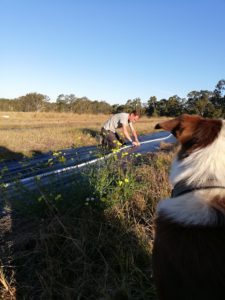
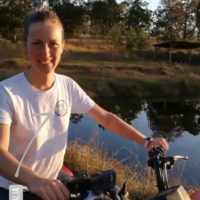
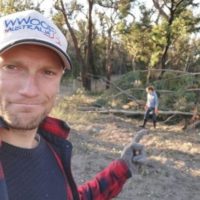
Every Sunday we went sightseeing and saw lots in the area and then we decided it was time for a change and because we could now travel we planned another trip but within 3 weeks our car broke down and was at the mechanic for a couple of weeks. To save money we searched for another place to WWOOF and we ended up in a nursery in Calen.
Your both from Belgium, so you do see many similarities in Organic Farmers here and what would they be?
We are not familiar with organic farming in Belgium. Your hosts are more connected with nature than the people we know in Belgium. The biggest difference is that in Belgium space is limited, and the climate does not allow for growing year-round so lots of produce is imported.
The difference with the animal stock we noticed is how you treat your cattle here. Your farmers let nature do most of the work, you put the bulls in the paddocks and let nature takes its course, right through to the birthing time, in Belgium a lot of the times you need a farmer and a vet to help the cows. When a cow or a calve dies here in the paddocks you leave it for scavengers to clean up. In Belgium, every death animal must be picked up and destroyed by an authorised company.
What have you both learnt to date regarding growing certain produce?
We learned a lot about growing exotic crops like bananas, pineapples, coconuts, papayas, native plants, tea tree and manuka honey. We both knew a little bit about beekeeping but now we really know what to do and what not to do. Two of our WWOOF hosts kept native bees so that was a great education to say the least.
In Braidwood the lady told us a lot about the evolution in farming (sheep and cattle) and land care. She knew a lot about regeneration, native trees and rehydration and making the soil better.
In Stanthorpe we mostly cleaned the bushfire affected property, but we also had the chance to prune some vines, and learned a lot about wine and winemaking in the process.
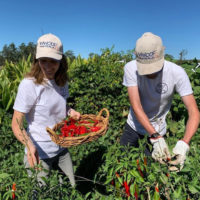
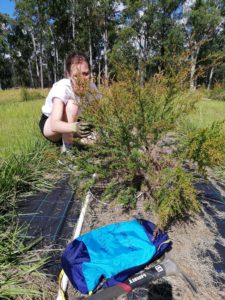
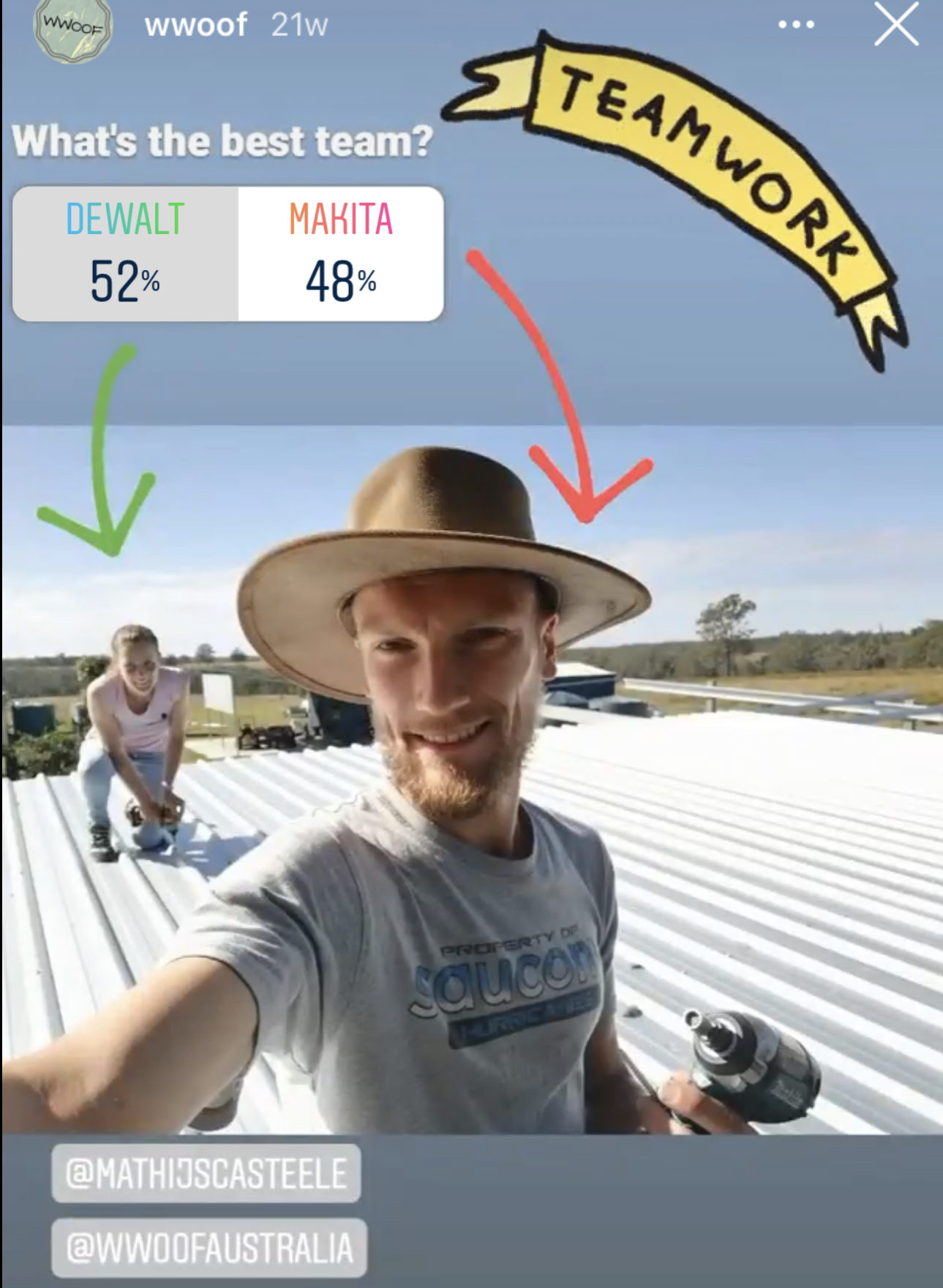
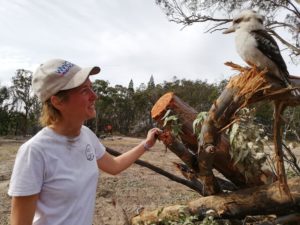
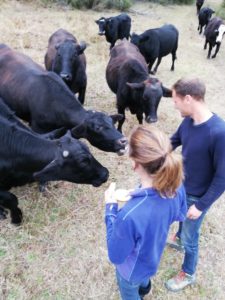
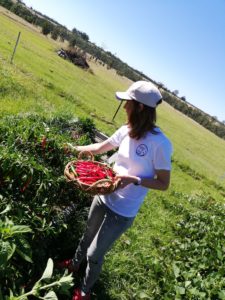
What have you both learnt about travelling as a couple for a length of time and sharing that time with others?
Because of my hours as a pastry chef and Mathijs job and being a runner, we did not really spend a lot of time together in Belgium although we have known each other for 10 years. Yes, it has been a challenge at times, and it is not always easy, but no big fights yet! Mathijs still goes running so that is when we have our own time. We are social and like to be with other people and have had the opportunity to meet and spend time with the locals sharing our stories. Having stayed with our hosts for a minimum of two weeks it does give you the opportunity to build a great relationship and talk about many things.
What have you learnt about the Australian culture that you didn’t know and were quite surprised to learn?
The cliche about Australians being “chilled” this is true with all the people we have met. Australians are always very welcoming and open, we even stayed with friends of our hosts who were so generous to offer us a bed, food, and their time. It seems that in Australia people make more time for family, friends, and their own hobby’s. For a lot of people in Belgium work is more important and it is the biggest and sometimes most important part of their life. Also, we did not know a lot about indigenous people and that for some of them it is only a few generations ago they had to adjust to a European civilization.
Would you recommend WWOOFing and why?
I would really recommend it to everyone, we already have along our travels even to people we know in Europe. A friend of ours really enjoyed WWOOFing in Austria! It is a great way to meet local people and learn more about the way they live, the culture and the neighborhood of the places you stay. When our hosts had any free time from their properties they took us on trips and showed us their favorite places. You s not only get to see so many things that “a normal tourist / backpacker” would never see but we have learnt so much along the way!
Even with COVID they welcomed us in their home and were extra caring and very protective even though we are 29 and 30 years old. Through WWOOFing we now have a lot of connections all over Australia, the greatest thing of all, we made friends for life who we can rely on whatever happens.-Thank you WWOOF Australia
Give a 2 year WWOOF Single or Dual Volunteer Membership to someone you love and give them the opportunity to travel alone, or with a friend or their family and live & learn on organic, permaculture & biodynamic farms, commercial and hobby farms, as well as suburban farms and gardens Australia wide.
WWOOFing is a safe, environmentally conscious and rewarding way to travel Australia on a budget, connecting with interesting people and giving back to the planet while building a raft of new and interesting skills to add to your resume.


